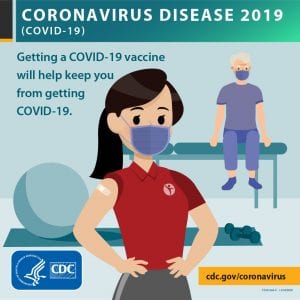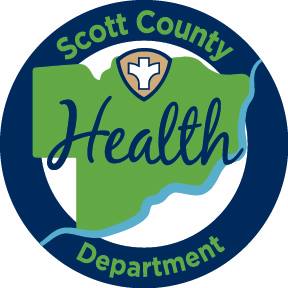Davenport School District Staff to Get Covid-19 Vaccine Over 9 Days
As part of the national rollout to vaccinate Americans against Covid-19, many staff of the Davenport Community School District (DCSD) will receive the vaccine soon to help protect students and others with whom they interact.
From Tuesday, Feb. 2, through this Thursday, and again Feb. 9 through Feb. 11, DCSD employees will receive the vaccine. The vaccination clinic will be held from 3-8 p.m. at the Achievement Service Center, 1702 N. Main Street, Davenport.

Schneckloth became the new Davenport schools superintendent in January 2021.
This measure is necessary to accommodate the return of students to their classrooms in the coming weeks, with the state requirement for 100-percent in-person education taking effect.
“The health of the families of the Quad-Cities is a top priority,” said T.J. Schneckloth, Superintendent of the DCSD. “Like all vaccine recipients, the staff members will continue to wear masks, observe social distance, and wash their hands diligently.”
Last week, the Iowa legislature passed an education bill requiring schools to give parents the option to send students to class full-time during the pandemic, a priority of Republican Gov. Kim Reynolds.
The bill passed the Senate 29-18 earlier on Thursday and later passed the House 59-39.
Schneckloth posted on the district website – DavenportSchools.org — that families have until this Friday to decide whether to have students attend fully in-person or fully remote.
Beginning February 15th, DCSD will shift from the hybrid learning model to 100% in-person learning. The 100% online learning model will continue to be available to students currently in the program, and any new students who select this as their preferred learning model.
Information on Covid-19 vaccine shots
The Mayo Clinic reminds shot recipients that it will take a few weeks for your body to build immunity, after receiving a Covid-19 vaccination. As a result, it’s possible that you could become infected with the virus that causes Covid-19, just before or after being vaccinated.

The Davenport school district will vaccinate staff this week and next.
According to the Centers for Disease Control and Prevention (CDC), wearing masks and maintaining social distance help to reduce your chance of being exposed to the Covid virus or spreading it to others. Even so, these measures are not enough. Vaccines work with your immune system so it can fight the virus if you are exposed. The vaccines now available in the U.S. are shown to be effective at preventing Covid-19.
Experts believe that getting the vaccine may help keep you from getting seriously ill, even if you do catch the disease. Getting vaccinated may also protect those around you, particularly people at increased risk for severe illness from Covid.
In the United States, the currently authorized vaccines to prevent Covid-19 require two shots to receive the most protection. Pfizer-BioNTech doses should be given three weeks (21 days) apart, and Moderna doses should be given one month (28 days) apart.
The second dose should be given as close to the recommended three-week or one-month interval as possible. There is no maximum interval

Local and national health officials recommend the Covid vaccine for everyone.
between the first and second doses for either vaccine, but you should not get the second dose earlier than the recommended interval.
In the U.S. so far, there have been 32.2 million Covid vaccine shots administered so far – 7.8 percent of the population has at least one shot, and just 1.8 percent has gotten two shots, according to a New York Times database.
In Iowa, 257,469 shots have been given – 6.1 percent of the population has got one shot and 1.9 percent two shots, which is among the states with the lowest vaccination percentage. The states with the highest percentage vaccinated are Alaska, West Virginia, New Mexico and Connecticut.
President Joe Biden has a goal of administering 100 million vaccines by the end of April.
Vaccine rollout in Scott County
According to the Scott County Health Department, due to the limited vaccine, the federal government and the state of Iowa have established priority groups that are being given the vaccine first due to their risk of exposure to Covid-19 and risk for serious illness or death as a result of Covid.
“We expect production of the vaccine to increase in 2021, when there will eventually be enough supply of the vaccine for everyone who would like to receive it,” according to the health department. The priority groups being vaccinated first are:
Phase 1A: Healthcare Workers & Long-Term Care Residents
Phase 1B: Current Phase – includes the following groups:

The Scott County Health Department is giving vaccine priority to people 65 and up, first responders, education staff (pre-K to 12), and others who work with children.
Persons aged 65 years and over, and the following populations vulnerable to high risk of exposure or severity of illness (listed in order of priority):
Tier 1
- First Responders
- Pre-K-12 staff, early childhood education, childcare workers
Tier 2
- Frontline essential workers in food, agriculture, distribution, and manufacturing sectors who live or work in non-social distanced settings
- Individuals with disabilities living in home settings and their direct care staff
Tier 3
- Staff and individuals living in congregate settings not covered by previous Phase or Tier
- Government officials, including staff, engaged in business at the State Capitol
Tier 4
- Inspectors responsible for health, life and safety
Tier 5
- Correctional facility staff and individuals incarcerated
Scott County Health Department will be using these prioritization guidelines to identify the populations vulnerable to high risk of exposure or severity of illness to provide vaccination while supply of vaccine remains low. In Scott County, 9,556 people have received at least one dose and 2,163 have received two doses, according to a dashboard from the state Department of Public Health.
The Iowa Department of Public Health has issued a vaccine shortage order. This order requires vaccine providers, by law, to only administer vaccines to individuals included in Phase 1A and Phase 1B.
Scott County also is working to educate the African-American community about the importance of vaccines. According to its fact sheet, the Covid vaccine does not interfere with anyone’s DNA.
“The vaccines do not cause someone to get sick with COVID-19,” the department says. “Vaccines teach our immune systems how to recognize and fight the virus that causes COVID-19. Both vaccine were found to be around 95% effective at protecting individuals from developing serious COVID-19 illness.
“They cannot yet say if it will help prevent spread to others. After getting the vaccine, individuals can experience some symptoms, such as a headache, fever, chills, arm pain,” the fact sheet says. “These symptoms are expected and are not considered reactions to the virus. They are signs the body is building immunity.”
For more information about the virus and the vaccination process, visit these healthcare websites:
Mayo Clinic:
https://www.mayoclinic.org/coronavirus-covid-19/public-guidance
Centers for Disease Control and Prevention (CDC):
https://www.cdc.gov/coronavirus/2019-ncov/index.html









